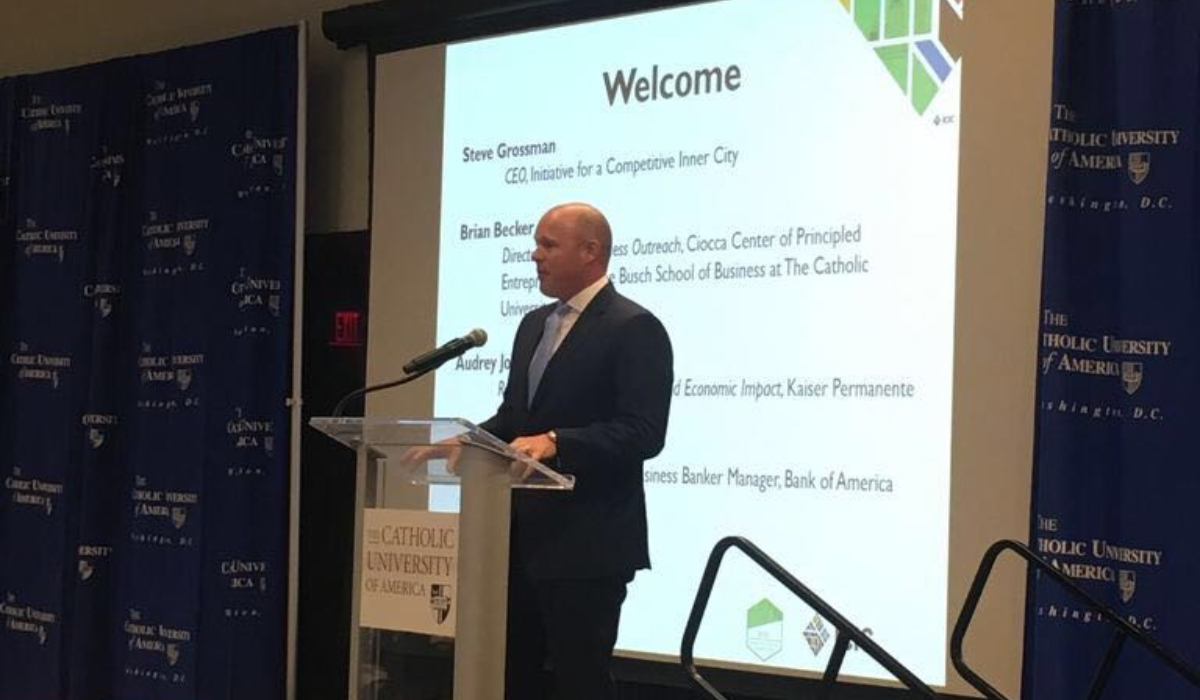ICCC Conference 2019 Recap
Washington, D.C. -- Over 90 entrepreneurs came to Catholic University’s campus to learn from industry experts as a part of the Inner City Capital Connections program (ICCC) on September 18, 2019.
Owners of small and medium-sized businesses participated in five presentations from professors and experts in business strategy, marketing, leadership, and finance. The conference was led by Brian Becker, Director of Small Business Outreach at the Ciocca Center for Principled Entrepreneurship and member of ICCC’s 2017 cohort, and Steve Grossman, CEO of the Initiative for a Competitive Inner City (ICIC).
Catholic University students participated in the conference as a part of the Small Business Growth Lab class. The students partner with local small businesses for the academic year to complete projects that help the entrepreneurs grow their businesses.
Professor Susan Perkins of the Kellogg School of Management began the conference with an interactive lecture to help attendees define and protect their competitive advantages in the marketplace.
“Gaining and sustaining a competitive advantage over your competitors requires deeper analysis of the firm’s strategic positioning, scope of business activities, and growth strategies, whether organic or through strategic partnerships and capabilities differentiation,” Perkins wrote in her presentation description.
Using case studies from companies such as Harry’s Razors, Spanx, and Java Nation, Catholic University marketing professor John Egan helped attendees evaluate their businesses’ marketing mixes and better target their appropriate customers.
The first two lectures reminded Catholic University student Elizabeth Rich about the importance of basing your business strategy on your target market’s needs.
“You don’t have to have some crazy revolutionary idea or whatever to be successful,” said Rich. “You just have to think about your market, their pains, their inconveniences and then help solve those problems.”
Steve Bookbinder led a workshop to review attendees’ practices with their workers. Bookbinder graphically showed his audience how an entrepreneur needs a balance of grit and empathy in order to succeed. By becoming more empathetic managers and leaders, Bookbinder believes small business entrepreneurs can turn their workforce into a sustainable competitive advantage.
In the final lecture, Professor Steven Rogers of Harvard Business School taught financial skills using interactive story problems. Audience members actively participated with their own calculations so they could apply their new financial skills to their own businesses after the lecture.
Each lecture ended with opportunities for attendees to partner with their tablemates to solve challenges their businesses faced.
“With one woman we were able to give her six possible solutions to this issue that her [sic] and her team have been struggling with just because we were fresh eyes,” Rich said.
The conference closed with a panel led by Becker of different capital providers to answer questions about the funding options entrepreneurs have available. Attendees asked questions about their specific capital needs and previous experiences attempting to access private funding in order to grow their businesses.
ICIC was founded in 1994 by Harvard Business School professor Michael Porter to “drive economic prosperity in America’s inner cities through private sector investment to create jobs, income, and wealth for local residents,” according to the ICCC 2019 Program Overview. Between 2005 and 2017, ICCC participants have “averaged 160% growth in revenue, created 19,907 jobs, and raised $1.92 billion in capital.”
The Ciocca Center for Principled Entrepreneurship previously hosted the regional ICCC conference in 2017 through their ongoing partnership with ICIC.

